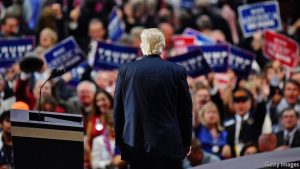 Yascha Mounk’s diagnosis is more convincing than his cure
Yascha Mounk’s diagnosis is more convincing than his cure
Print edition | Books and arts The Economist.
DEMOCRACY is going through its worst crisis since the 1930s. The number of countries that can plausibly be described as democracies is shrinking. Strongmen are in power in several countries that once looked as if they were democratising, notably Russia, Turkey and Egypt. The United States—the engine room of democratisation for most of the post-war period—has a president who taunted his opponent with chants of “lock her up” and refused to say if he would accept the result of the election if it went against him.
But what exactly is the nature of this crisis? And what is driving it? Yascha Mounk’s “The People vs Democracy” stands out in a crowded field for the quality of its answers to these questions. Mr Mounk provides an admirable mixture of academic expertise and political sense. He teaches at Harvard University, where he has busied himself collecting opinion-poll data, but he grew up in pre-1989 West Germany, where the distinction between real and pretend democracy was more than just academic. He also takes the trouble to unpick terms that too many commentators on this subject take for granted.
Mr Mounk argues that there are two sides to liberal democracy. One focuses on the first half of the equation: protecting individuals from the tyranny of the majority through checks and balances and enumerated rights. The second focuses on the other half: handing power to the people. For most of the post-war period these two versions of liberal democracy went together like apple and pie.
Today, though, the popular will is increasingly coming into conflict with individual rights. Liberal elites are willing to exclude the people from important decisions, most notably about immigration in the case of the European Union, in the name of “rights”; meanwhile populists are willing to dispense with constitutional niceties in the name of “the people”. Politics is defined by a growing battle between illiberal democracy, or democracy without rights, on the one hand, and undemocratic liberalism, or rights without democracy, on the other.
The most obvious reason why liberal democracy is splitting into its component parts lies in slow economic growth. From 1960 to 1985 the income of the typical American household doubled. From 1985 it remained flat while a tiny minority of Americans saw their incomes surge. Liberal elites tend to explain this divergence in terms of the laws of globalisation. Populists have a darker interpretation: that those elites are using a mix of lobbying power, personal connections and technocratic expertise to rig the system to their own advantage—most notoriously by bailing out the banks with taxpayers’ money.
Mr Mounk points to several other developments that help explain the divide. The social-media revolution is transferring power from traditional media gatekeepers to laptop warriors. As well as enabling malign people to spread fake news, as many have pointed out, this revolution is also making it easier for outsiders to draw attention to self-dealing. The increasing diversity of Western societies, driven partly by immigration and partly by the idea that different groups should celebrate their differences rather than adopting dominant mores, is politicising the question of racial identities, with potentially explosive consequences. Political entrepreneurs are upending politics by taking over old parties, like Donald Trump, or creating new parties, like Italy’s Beppe Grillo, exploiting pent-up resentment of the old elites and using the new media to get their message across, raw and unfiltered.
Mr Mounk is far less convincing on the question of what to do about this dismal situation. He makes some valiant suggestions. He argues that technocratic elites need to moderate their ambitions. The more they try to protect important areas of decision-making, not least immigration, from the will of the people, the more they will create festering resentment. He urges policymakers to focus on domesticating nationalism rather than attempting to sideline it as an anachronistic relic. He makes a good case for devoting more effort to turning children into citizens through civic education. Here he is admirably sharp with his fellow academics who are so bent on presenting Western civilisation as a history of oppression that they risk undermining any residual faith that their students might have in democracy.
Yet he spends too little time grappling with the nuances of these ideas—for example how you persuade a technocratic European elite to listen to the voices of the people when all the bureaucratic incentives are to ignore them. And he throws in too many banal bromides about “fixing the economy”, as if there were no difficult trade-offs between, say, raising productivity levels and destroying stable jobs. It is as if Mr Mounk’s publishers asked him to provide a Hollywood-style happy ending, after all the blood and gore, and he has simply gone through the motions without any real conviction.
“The People vs Democracy” is a chastening read for all sorts of reasons. It provides lots of evidence to suggest that the battle between illiberal democracy and liberal elitism will only become more intense. It demonstrates that those harbingers of openness, young people, are in fact much more sceptical about democracy than are their seniors. But the biggest reason for its chilling effect is unwitting: the prescriptions for saving democracy are so much feebler than the explanation of why it is in danger.



